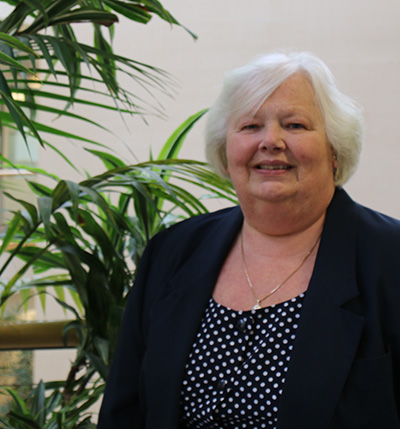Shirley Crookes, Wellbeing Support Services
Name: Shirley Crookes
Job title: Deputy Director, Wellbeing Support Services
Department: Wellbeing Support
Role in relation to examinations: Ensuring support is available before, during and after the examination period
Can you tell us a little bit about your usual role?
I manage, alongside the Heads of Services, the teams of people working in Counselling Disability Services, Mental Health and Wellbeing and general Student Support. The office is also responsible for the administration of the Residential Life Team (RLT). In addition I sit on various university committees in which I feel I can represent the view of students.
What’s your involvement in the examination period?
The teams get involved early on in the year liaising with departments to establish reasonable adjustments and mitigating circumstances, ensuring appropriate evidence is produced and that there is parity between individuals. Numbers requesting these adjustments are growing and we are aware of the need to give departments as much notice as possible.
During the exam period itself, apart from full diaries for the team, we do try to have someone ‘on duty’ to help manage any acute distress either just prior, during or just after the actual exam. This duty is covered in conjunction with the Students’ Union and the RLT.
The key element of this time for me and the teams is trying to ensure that those who can sit their exams do so to the best of their ability, and that those who, for whatever reason, are not able to sit them, are aware of what options are open to them and are pointed in the right direction to get the help they need.
What do you enjoy about your involvement?
Understandably sometimes people are devastated at missing an exam or leaving early. Whilst clearly this isn’t ideal, often all is not lost and their situation can be salvaged in some way or other. Sometimes simply pointing out what proportion of their degree a particular exam stands for can put things into perspective and relieve some of the distress.
What’s most important for you about the examination period?
You cannot avoid the importance of people looking after themselves physically and emotionally particularly at this time. We want the brain and the body to be at peak performance but we cannot expect this if we don’t look after them. We still need a good balance of eating, sleeping and exercise, even when the only thing that feels important is revision.
Exams can be seen as an opportunity to shine, to let yourself and others know what you know and how you have been working. All our students have the potential to do well otherwise they would not be here.
Are there any challenges?
This is a difficult time for those who, for whatever reason, have not been able to function well during the year and they might have been denying it to themselves and others. Often there is a feeling of regret or leaving things too late, a feeling of hopelessness and it might be hard to find motivation. I usually say to people the state of knowing nothing and knowing everything does not exist, but in between there is a line and the aim is to get as a far as possible along that line in the direction of knowing. Highlighting to yourself any acquisition of knowledge can be encouraging, so telling yourself, the mirror or a friend what you have learnt in your last revision session can help motivate and reassure.
What would you say to colleagues involved?
Exams come at the end of the year when all the teams are feeling a degree of exhaustion, but we know how vital the period is. So a big thank you to colleagues for keeping up the high standards they set themselves. As the summer vacation approaches we all delude ourselves that things will get quieter and we will soon have the opportunity to do those tasks we have set aside for the summer. Although we know we will continue to be busy throughout, most of the tasks will get done eventually and we will be there at arrivals weekend with renewed energy and enthusiasm ready to welcome students for another year!
In three words, what tip or advice would you give students?
Am I allowed 3 sentences on taking the actual exams?
- Remember to THINK in an exam. You have your brain there in the room with you, not just your memory
- READ the questions carefully, there are no marks for waffle
- TECHNIQUE is important. Don’t have a post mortem on what you put or didn’t put. It is too late now. But do check out how was your timing, memory recall, choice and ordering of questions. Lessons learnt here maybe useful for next time.
Whatever the outcome of the exams, there is always something to learn from the experience. How you have done will give you options - sometimes different options from those you expected, but still options. Sometimes these send you in a different direction which might be the best way for you. Sometimes they send you in a direction you don’t really want to go. Then is the time to say “ok, this is how it has to be for now but how can I get back on the track I want to be on?”

